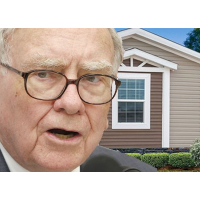House Passes Bill to Help Warren Buffett and Berkshire Hathaway
 Warren Buffett (photo illustration: Steve Straehley, AllGov)
Warren Buffett (photo illustration: Steve Straehley, AllGov)
A bill approved by the Republican-dominated House would benefit a company owned by billionaire Warren Buffett while reducing protections for mobile home buyers.
The legislation, authored by Representative Stephen Fincher (R-Tennessee), would change consumer protection provisions created by the Dodd-Frank Act and almost exclusively benefit Clayton Homes, a company controlled by Buffett’s Berkshire Hathaway, according to The Seattle Times.
The newspaper, working with the Center for Public Integrity (CPI), had previously found Clayton—which controls 91% of the mobile home market—subjected its customers to high interest rates, excessive fees and predatory sales practices.
Clayton is headquartered in Tennessee, Fincher’s home state. He received far more campaign money from Clayton employees than any other candidate in the 2014 election cycle: $15,150, according to OpenSecrets.org.
Fincher’s bill would raise the interest rates allowed on some mobile home loans before they trigger extra protections for borrowers such as pre-loan counseling, CPI’s Alison Fitzgerald wrote. It also would allow mobile-home salespeople to work closely with buyers to arrange financing.
Unlike conventional homes, mobile homes can lose value quickly, often making them worth far less than what a borrower owes.
The investigation revealed that Clayton buyers are often stuck with loans that come with interest rates that can exceed 15%. Loans offered by Clayton-affiliated companies average 7 percentage points higher than conventional home loans usually cost. The average for all mobile home loans is 3.8% higher than for conventional homes.
Clayton dealers also get kickbacks for steering financing and insurance business to companies linked to their corporate parent, according to former employees.
Fincher’s bill is now in the Senate where it awaits a hearing by the Senate Banking Committee. Even if the bill passes the Senate, President Obama has promised to veto it, saying it would put consumers “at significant risk of being subjected to predatory lending and being steered into more expensive loans.”
Even without the extra help from Congress, Clayton has proven to be another good investment for Buffett: it earned $558 million before taxes in 2014, up 34% from 2013.
-Noel Brinkerhoff, Steve Straehley
To Learn More:
Congressional Proposal Might Only Benefit Firm That Was Subject Of Probe (by Alison Fitzgerald, Center for Public Integrity)
House of Representatives Passes Predatory Manufactured Housing Bill in Party Line Vote (by Katherine Lucas McKay, The Inclusive Economy)
Warren Buffett’s Mobile Home Empire Preys on the Poor (by Daniel Wagner and Mike Baker, Center for Public Integrity)
A Look At Berkshire Hathaway’s Response To ‘Mobile Home Trap’ Investigation (by Daniel Wagner and Mike Baker, Center for Public Integrity)
- Top Stories
- Unusual News
- Where is the Money Going?
- Controversies
- U.S. and the World
- Appointments and Resignations
- Latest News
- Trump Orders ICE and Border Patrol to Kill More Protestors
- Trump Renames National Football League National Trump League
- Trump to Stop Deportations If…
- Trump Denounces World Series
- What If China Invaded the United States?






Comments